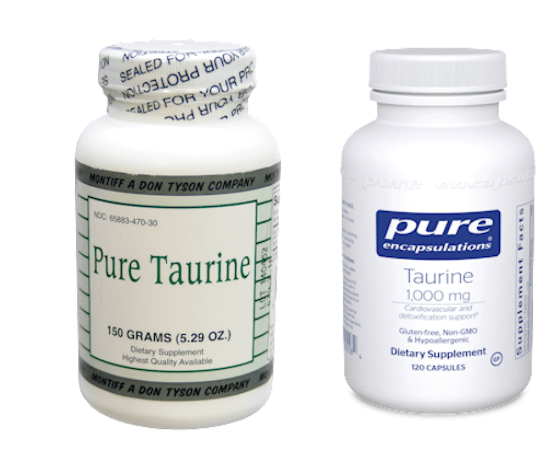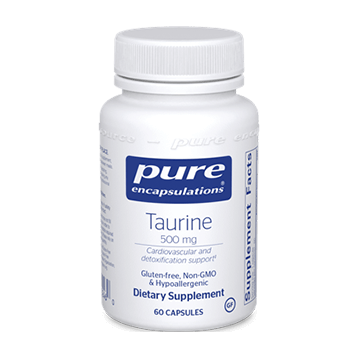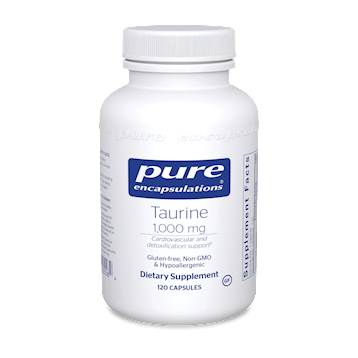Top 5 Amazing Benefits of Taurine
| | Reading Time: 4 minutes

You likely already know about taurine because it’s in many energy drinks. But taurine is not a stimulant, like caffeine. And taurine is more than just an antioxidant or energy booster.
Beyond Energy Drinks: Why You Need Enough Taurine
Taurine is a beta-amino acid with antioxidant, calcium regulation, and vasodilating effects. It occurs in many tissues, including the heart, brain, retina, and muscles. True, taurine supports mitochondria, your cells’ powerhouses, but it has additional benefits beyond boosting energy.
Here are five reasons to get enough taurine every day.
The Five Top Benefits of Taurine
1. Benefits for heart health
Taurine has noticeable benefits for the cardiovascular system. It was approved to treat heart failure patients in Japan in 1985. I’ve used it in my practice since around the same time. My chronic heart failure patients feel better and live longer when taking taurine. Studies show that it improves cardiac output and stroke volume. It can help lower blood pressure. And taurine has a modest effect on managing total cholesterol and triglyceride levels.
2. Supports mitochondrial function and relieves symptoms of chronic fatigue syndrome (CFS)
Taurine, along with vitamin C, may improve chronic fatigue syndrome symptoms. Recent research found that taurine protects mitochondria, the cell’s energy powerhouse. Technically, mitochondria are organelles found within cells that regulate various processes, including generating ATP for energy.
3. Promotes recovery after intense exercise
Though taurine is popularly known as an energy booster and exercise performance enhancer, the benefit is modest. However, since it supports muscle function, it improves recovery after intense workouts.
4. Helps manage metabolic syndrome
Supplementing with taurine is helpful in patients with metabolic syndrome and can reduce complications in type II diabetes. Some find it helps weight loss.
5. Aids learning and memory
Taurine is one of the most abundant amino acids in the brain. Adequate taurine in the diet or supplementation protects brain cells from the consequences of chronic neuroinflammation—a common condition during aging. And it can significantly improve learning and memory.
Is taurine the forgotten nutritional supplement?
Taurine-Rich Foods
Taurine is found in many common foods, mostly in meat and fish. Therefore, vegans and vegetarians are susceptible to taurine inadequacy. Besides dietary deficiency, taurine gets depleted by too much glucose. Overeating fruits, drinking fruit juices, and adding honey or agave syrup to herbal teas may deplete taurine.
However, you may need more taurine than adequate amounts from foods alone. Taurine supplements are inexpensive and readily available.
Benefits of Taurine Supplement Dosing & Safety
Amino acids, like taurine, absorb best without food. Take taurine on an empty stomach. Divide your daily amount into two equal doses. When using higher amounts, take them three times per day.
If you eat foods rich in taurine, support your health with 500 mg twice daily. For increased taurine support, take 1,000 mg three times daily. Taurine is safe to take up to 3,000 mg daily. However, some need more.
For enhanced recovery after intense exercise, take 2,000 mg three times daily for a few days after your workout. You can also add powdered taurine to your sports drink or protein shake. Take 2,000-4,000 mg per shake post-workout.
Though generally safe, there are a few precautions to consider. Taurine is not recommended for those with advanced kidney disease. Since it can lower blood pressure, avoid it when taking antihypertensive drugs. For extra safety, pregnant and nursing women should not take high doses of taurine.

Specific vitamins and minerals work synergistically with taurine, especially B-6 (including the active form, Pyridoxal 5’Phosphate) and zinc. Take taurine with a multivitamin and mineral or a B-complex. Choose pure taurine supplements as a powder to mix in protein shakes or capsules.
Taurine benefits FAQs
Taurine is an interesting nutrient. Unlike other amino acids, it’s not essential for humans. However, it supports health and maintains wellness. Taurine is a nonprotein amino acid found in animal tissues. It’s a common biomolecule in human cells, including the retina, white blood cells, platelets, muscle, and the brain. Enough taurine is necessary because it acts as a neurotransmitter in chemical messages affecting mood, behavior, brain function, and energy. Taurine promotes healthy aging and improves longevity.
Is taurine an essential nutrient?
What is the daily requirement for taurine?
How do I know if I’m taurine deficient?
Can you take too much taurine?
Does taurine help chronic fatigue?
Can taurine improve mitochondrial function?
Does taurine help metabolic syndrome?
How much taurine do I need?


Can you take taurine on an empty stomach?
When is the best time to take Taurine?
Can I use taurine for weight loss?
Which is the best way to take Taurine?
How long does taurine stay in your system?
References:
Chen W, Guo J, Zhang Y, Zhang J. The beneficial effects of taurine in preventing metabolic syndrome. Food Funct. 2016 Apr;7(4):1849-63. doi: 10.1039/c5fo01295c. PMID: 26918249.
Jong CJ, Sandal P, Schaffer SW. The Role of Taurine in Mitochondria Health: More Than Just an Antioxidant. Molecules. 2021 Aug 13;26(16):4913. doi: 10.3390/molecules26164913. PMID: 34443494; PMCID: PMC8400259.
Rafiee Z, García-Serrano AM, Duarte JMN. Taurine Supplementation as a Neuroprotective Strategy upon Brain Dysfunction in Metabolic Syndrome and Diabetes. Nutrients. 2022 Mar 18;14(6):1292. doi: 10.3390/nu14061292. PMID: 35334949; PMCID: PMC8952284.
Rais, N., Ved, A., Shadab, M., Ahmad, R. and Shahid, M. (2023), “Taurine, a non-proteinous essential amino acid for human body systems: an overview,” Arab Gulf Journal of Scientific Research, Vol. 41 No. 1, pp. 48-66. https://doi.org/10.1108/AGJSR-04-2022-0019
Jong CJ, Sandal P, Schaffer SW. The Role of Taurine in Mitochondria Health: More Than Just an Antioxidant. Molecules. 2021; 26(16):4913. https://doi.org/10.3390/molecules26164913
Samara P. Silva et al. “Neuroprotective Effect of Taurine against Cell Death, Glial Changes, and Neuronal Loss in the Cerebellum of Rats Exposed to Chronic-Recurrent Neuroinflammation Induced by LPS,” Journal of Immunology Research, vol. 2021, Article ID 7497185, 10 pages, 2021. https://doi.org/10.1155/2021/7497185
Schaffer S, Kim HW. Effects and Mechanisms of Taurine as a Therapeutic Agent. Biomol Ther (Seoul). 2018 May 1;26(3):225-241. doi: 10.4062/biomolther.2017.251. PMID: 29631391; PMCID: PMC5933890. https://www.ncbi.nlm.nih.gov/pmc/articles/PMC5933890/
Xu YJ, Arneja AS, Tappia PS, Dhalla NS. The potential health benefits of taurine in cardiovascular disease. Exp Clin Cardiol. 2008 Summer;13(2):57-65. PMID: 19343117; PMCID: PMC2586397. https://www.ncbi.nlm.nih.gov/pmc/articles/PMC2586397/
Yamano E, Watanabe Y, Kataoka Y. Insights into Metabolite Diagnostic Biomarkers for Myalgic Encephalomyelitis/Chronic Fatigue Syndrome. Int J Mol Sci. 2021 Mar 26;22(7):3423. doi: 10.3390/ijms22073423. PMID: 33810365; PMCID: PMC8037376. https://pubmed.ncbi.nlm.nih.gov/33810365/


